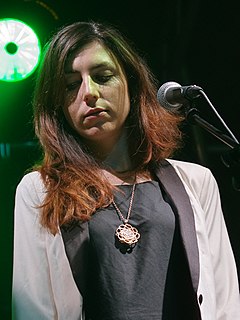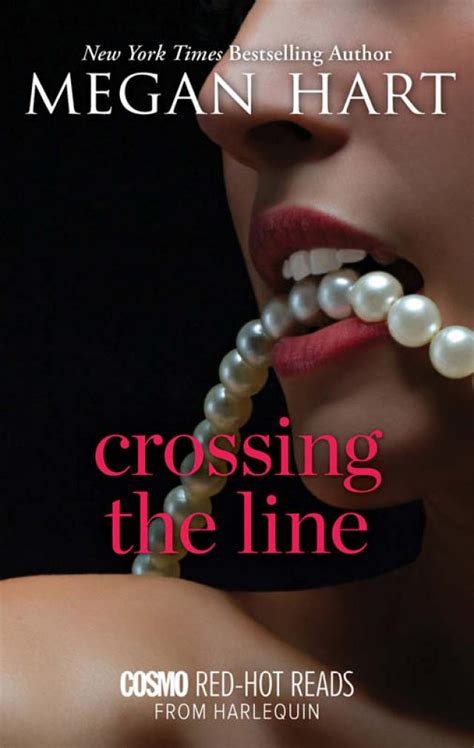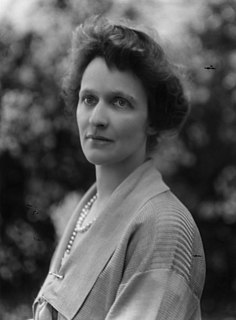A Quote by Julia Holter
I did study with Anne Carson briefly in Michigan. She taught there, and that's where I first encountered her, in her class.
Related Quotes
I think she [Rosalind Franklin] was a good experimentalist but certainly not of the first rank. She was simply not in the same class as Eigen or Bragg or Pauling, nor was she as good as Dorothy Hodgkin. She did not even select DNA to study. It was given to her. Her theoretical crystallography was very average.
The world taught women nothing skillful and then said her work was valueless. It permitted her no opinions and said she did not know how to think. It forbade her to speak in public and said the sex had no orators. It denied her the schools, and said the sex had no genius. It robbed her of every vestige of responsibility, and then called her weak. It taught her that every pleasure must come as a favor from men and when, to gain it, she decked herself in paint and fine feathers, as she had been taught to do, it called her vain.
But what I kept wondering about is this: that first second when she felt her skirt burning, what did she think? Before she knew it was candles, did she think she'd done it herself? With the amazing turns of her hips, and the warmth of the music inside her, did she believe, for even one glorious second, that her passion had arrived?
The pain was as unexpected as a thunderclap in a clear sky. Eddis's chest tightened, as something closed around her heart. A deep breath might have calmed her, but she couldn't draw one. She wondered if she was ill, and she even thought briefly that she might have been poisoned. She felt Attolia reach out and take her hand. To the court it was unexceptional, hardly noticed, but to Eddis it was an anchor, and she held on to it as if to a lifeline. Sounis was looking at her with concern. Her responding smile was artificial.
We went to the same college so I know [Hillary Clinton's] study habits, but when she was first lady of Arkansas, she did a lot of things already for children, and she was head of the Children's Defense Fund, and that's how I first heard her or met her, she was very very involved in really a very important social program to do something about children and women and education.
There was no mistaking her sincerity--it breathed in every tone of her voice. Both Marilla and Mrs. Lynde recognized its unmistakable ring. But the former understood in dismay that Anne was actually enjoying her valley of humiliation--was reveling in the thoroughness of her abasement. Where was the wholesome punishment upon which she, Marilla, had plumed herself? Anne had turned it into a species of positive pleasure.
In her memoir, Anne Robinson recounts the wake-up call which motivated her to stop drinking. Leaving her eight-year-old daughter alone in their car while she went to buy liquor, she returned to find her daughter with tears running down her cheeks. The guilt and horror Ms. Robinson felt at this sight jolted her into sobriety.
"She (Minnie Ruth Solomon) was unusual because even though I knew her family was as poor as ours, nothing she said or did seemed touched by that. Or by prejudice. Or by anything the world said or did. It was as if she had something inside her that somehow made all that not count. I fell in love with her some the first time we ever talked, and a little bit more every time after that until I thought I couldn't love her more than I did. And when I felt that way, I asked her to marry me . . . and she said she would."
He hadn’t been her first lover or the first boy to give her an orgasm. He hadn’t even been the first she’d loved. He’d been the first to turn her inside out with something as simple as a smile. The first to make her doubt herself. He’d taken her deeper than anyone ever had, and yet she hadn’t drowned.
I was raised by a lady that was crippled all her life but she did everything for me and she raised me. She washed our clothes, cooked our food, she did everything for us. I don't think I ever heard her complain a day in her life. She taught me responsibility towards my brother and sisters and the community.
But when did you see her, talk to me? When did you see her go into the cave? Why did you threaten to strike a spirit? You still don't understand, do you? You acknowledged her, Broud, she has beaten you. You did everything you could to her, you even cursed her. She's dead, and still she won. She was a woman, and she had more courage than you, Broud, more determination, more self-control. She was more man than you are. Ayla should have been the son of my mate.




































